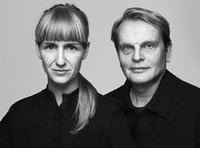Designed by TAF Studio for Muuto, the 70/70 table has an almost anonymous expression with beautiful detailing. The table is based upon two cast aluminium squared frames with the dimension of 70 x 70 centimetres, hence the name 70/70. The table top is made of plywood. The Scandinavian aesthetics can be seen in the airy, simple form of the table and in the plywood details. The 70/70 table is multifunctional, and it is perfect as a dining table or as an office table.
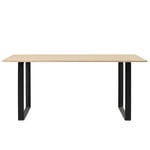
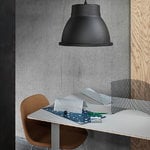
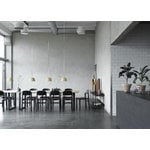
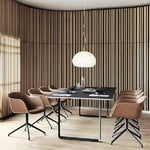
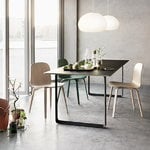
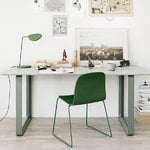
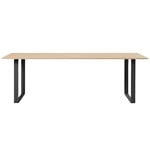
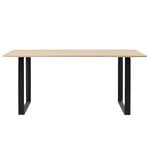
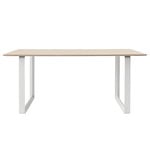
70/70 table, 170 x 85 cm, oak
Muuto
Description
Designed by TAF Studio for Muuto, the 70/70 table has an almost anonymous expression with beautiful detailing. The table is based upon two cast aluminium squared frames with the dimension of 70 x 70 centimetres, hence the name 70/70. The table top is made of plywood. The Scandinavian aesthetics can be seen in the airy, simple form of the table and in the plywood details. The 70/70 table is multifunctional, and it is perfect as a dining table or as an office table.
Product details (8)
- Colour
- Oak, black / grey / white
- Length
- 170 cm
- Measurement details
- Length between legs: 120 cm
- Width
- 85 cm
- Height
- 73 cm
- Main material
- Oak plywood table top supported by a metal frame
- Base material
- Cast aluminium
- Care instructions
- Clean with damp cloth. If necessary only use a mild detergent. Wipe with a dry cloth afterwards. Remove stains and marks straight away.
- Product ID
Designer
The Swedish architects Gabriella Lenke and Mattias Ståhlbom have run the architecture and design studio TAF (previously TAF Architects) in Stockholm, Sweden, since 2002. TAF Studio’s aim is to make ordinary life less ordinary through subtle but effective changes in how products and architecture appear and function. A recurrent departure point in TAF Studio’s projects is that everyday objects by their very commonness can be made uncommon.
View all productsReviews (0)
Sustainability
The Product Sustainability Framework, our criteria of sustainable design, helps you find the most sustainable products in our selection. Read below which sustainability criteria this product has met.
Working conditions & labour 7/9
-
Equal opportunities for all employees
-
Commitment to UN Global Compact, fair compensation for all employees
-
Corporate responsibility requirements defined and communicated for suppliers
-
Systematic work for improved inclusion and well-being in the workplace
-
Transparent supply chain
-
Suppliers' compliance to a code of conduct ensured
-
Compliance to the UN Guiding Principles on Business and Human Rights ensured in the supply chain
-
Direct suppliers audited and certified
-
Support for community involvement in the supply chain
Eco-friendly production 9/9
-
Fair and resource-wise water-use in production
-
No incineration or landfilling of returned items
-
No use of endangered species as materials
-
No direct environmental emissions or waste (excl. GHGs) from production
-
The sustainability of direct suppliers' production is addressed and monitored
-
Production and material sourcing that respect biodiversity, animal rights, and natural ecosystems
-
Material-efficient and ecological packaging
-
Positive impact on nature’s well-being through operations that regenerate natural ecosystems
-
No potentially harmful chemicals used in own production
Climate impact 4/8
-
Company's direct greenhouse gas emissions identified and commitment to reduction
-
Product's carbon impact identified and commitment to reduction
-
Guidance on energy- and eco-efficient use of the product
-
Contribution to climate initiatives beyond the brand’s direct operations
-
Low-carbon or compensated transportation
-
Carbon footprint of the product calculated and goals set to reduce it
-
100 % renewable energy in own production and operations
-
Carbon neutral or carbon negative product
Sustainable materials 5/6
-
Sustainable and long-lasting material choices
-
No harmful or hazardous substances
-
Responsible raw material sourcing and production
-
Materials suited for circularity: monomaterials, recyclable finishings, renewable or recycled contents etc.
-
Ecological materials: natural, biodegradable, recyclable or recycled contents
-
Outstanding materials in terms of innovativeness, responsibility, sustainability and circularity: local production or sourcing, 100 % recycled content, C2C-certification etc.
Circular design 4/5
-
High aesthetic quality promoting long-term use of the product
-
Technically durable product design and material choices
-
Design for enduring life-long quality
-
Design and support for product maintenance, repair and upgradability
-
Innovative circular design solutions: circular service system, resale platform, remanufacturing, collection of used products, etc.









